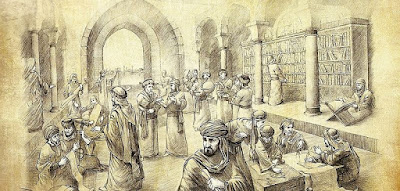 I finished Darwin's Ghosts by Rebecca Stott last weekend, but I've been so busy I haven't had a chance to review it! Stott's book originally caught my attention in a New York Times review, and a librarian it seemed like something I had to read. I was hoping it would give me some ideas on new approaches to talking to my students about plagiarism, and I think it did.
I finished Darwin's Ghosts by Rebecca Stott last weekend, but I've been so busy I haven't had a chance to review it! Stott's book originally caught my attention in a New York Times review, and a librarian it seemed like something I had to read. I was hoping it would give me some ideas on new approaches to talking to my students about plagiarism, and I think it did.I loved that Stott addresses right off the bat whether or not Darwin intended to ignore his predecessors - it sounds like he did not. According to Stott, he was intimidated by trying to give credit to all of his predecessors; a feeling most students would identify with, I think. She also discusses his struggle to do so in later editions of his work.
 |
| Charles Darwin |
Overall this was an interesting look at the evolution of the theory of evolution (see what I did there?), discussing each of Darwin's predecessors in turn. It gave mini biographies of some really interesting thinkers, but it also showed how theories gradually led to a full theory of evolution and how each theorist gradually added to our understanding of the history of species.
Stott starts with Aristotle and his proteges and their collection of various species. It was really amazing to think about Aristotle prowling around taking fish from fisherman and asking them about their observations of sea creatures.
Perhaps my favorite chapter was the one on Jahiz, which discusses the "House of Wisdom" and the Golden Age of Baghdad under the Abbasid Empire. I knew that there was a segment of history where the Middle East was far ahead of Europe in terms of culture and science, but I didn't know much about it beyond that, and this chapter really made me want to read more about this period.
 |
| The House of Wisdom during the Islamic Golden Age. In the Public Domain, from Wikimedia Commons. |
The book goes on to discuss Leonardo da Vinci, then Trembley and his discovery of the regenerative powers of the polyp (what we learned about in 7th grade biology as the hydra). She again leaves Europe to discuss Benoit de Maillet in Cairo in the early 1700s. I also loved this chapter, which discusses the realization by Maillet and others that parts of the Earth that are now land used to be underwater and the intellectual quest to figure out how that could be.
 |
| Alfred Wallace |
Stott then returns to Europe to discuss the Hotel of Philosophers in Paris, with greats such as Diderot and d'Holbach and the creation of the Encyclopedia. She devotes an entire chapter to Erasmus Darwin (Charles' grandfather!), then returns to Paris and the Jardin des Plantes. She also has a chapter devoted to Robert Grant, who knew Charles Darwin, and his fascination with the sea sponge. She wraps up with discussions of Robert Chambers and his Edinburgh Journal, with a final chapter devoted to Alfred Wallace, who arguably reached the same conclusions regarding sexual selection as Darwin before Darwin's theories were made public. (As a side note, I love that she also discusses at length Wallace's research companion, Ali.)
One of my other favorite parts of this book was the discussion of the intellectual freedom of most of the predecessors of Darwin. She discusses in depth how difficult and dangerous it was for many of these great thinkers to make their theories and their work public; some had to use pseudonyms, others risked imprisonment for speaking out. Intellectual freedom is an area I am really interested in and passionate about, so I loved that she devoted a good chunk of the book to addressing it.
Overall a really fascinating, intellectual stimulating read - I definitely recommend.



No comments:
Post a Comment